You are using an out of date browser. It may not display this or other websites correctly.
You should upgrade or use an alternative browser.
You should upgrade or use an alternative browser.
Another Big Win For Putin!!!
- Thread starter 88m3
- Start date
-
- Tags
- putin russia vladimir world news
More options
Who Replied?88m3
Fast Money & Foreign Objects
88m3
Fast Money & Foreign Objects
88m3
Fast Money & Foreign Objects
Russia overplays its hand in Syria
US charges Chinese firm for breaking North Korea sanctions
https://www.ft.com/content/7a14e778-8409-11e6-8897-2359a58ac7a5

US charges Chinese firm for breaking North Korea sanctions
https://www.ft.com/content/7a14e778-8409-11e6-8897-2359a58ac7a5

ironic they're reposting this
88m3
Fast Money & Foreign Objects
ironic they're reposting this
subtle but telling
88m3
Fast Money & Foreign Objects
88m3
Fast Money & Foreign Objects
COLD
fukkING
WAR
Told yall.
This is the new normal.
88m3
Fast Money & Foreign Objects
88m3
Fast Money & Foreign Objects
88m3
Fast Money & Foreign Objects
Nato sends a message to Russia
Jonathan Marcus Diplomatic correspondent
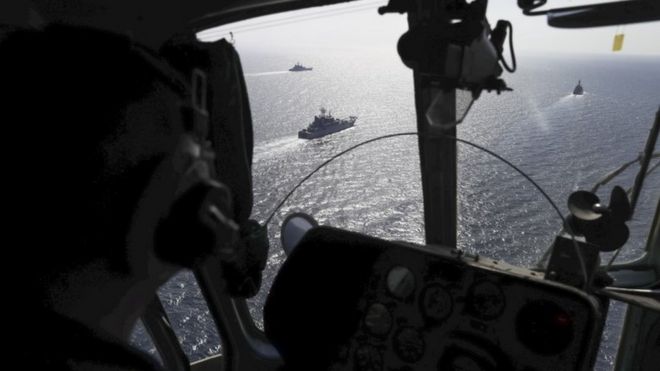 Image copyrightAP
Image copyrightAP
Image captionPresident Putin insists the West has nothing to fear over the manoeuvres of his forces
President Vladimir Putin's assurance that Russia does not plan to attack any other country will not change many minds here at the Nato headquarters in Brussels.
They will simply point to the seizure of the Crimea and the Russian military's continuing support for the rebels in eastern Ukraine as a sure sign of Moscow's growing assertiveness.
Mr Putin also says that the Russian military threat is being exaggerated in the West to justify increased military spending.
Well there is certainly a good deal of hyperbole in some sections of the Western media.
The transit of the small naval task force led by Russia's sole and ageing aircraft carrier - the Admiral Kuznetsov - through the English Channel, for example, sent many British newspapers into a spin.
Not a new Cold War
Frequent stories about the interception of Russian aircraft or Russian submarines all suggest a return to the more uneasy years of the Cold War.
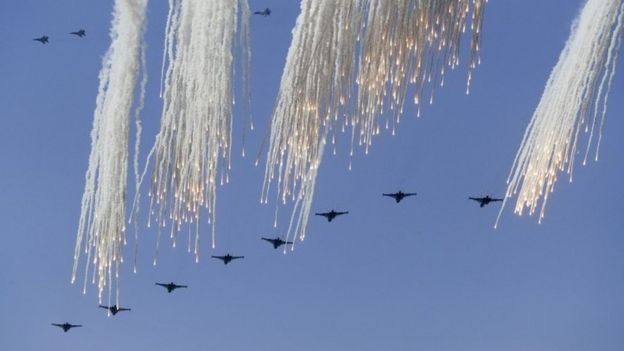 Image copyrightAP
Image copyrightAP
Image captionRussia has shown in the recent past that it is sometimes ready to use force in Europe to secure its goals
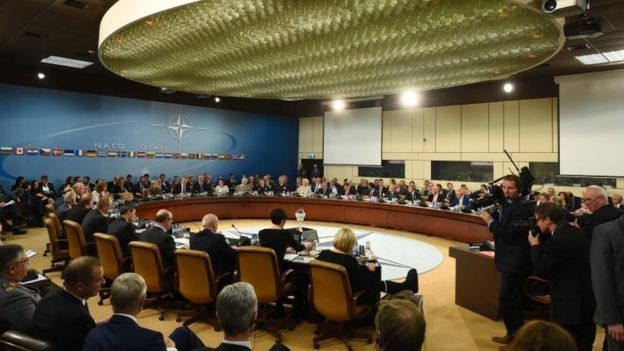 Image copyrightAFP
Image copyrightAFP
Image captionNato defence chiefs in Brussels want to reassure worried alliance members and send a clear message to Moscow that they can respond to aggression
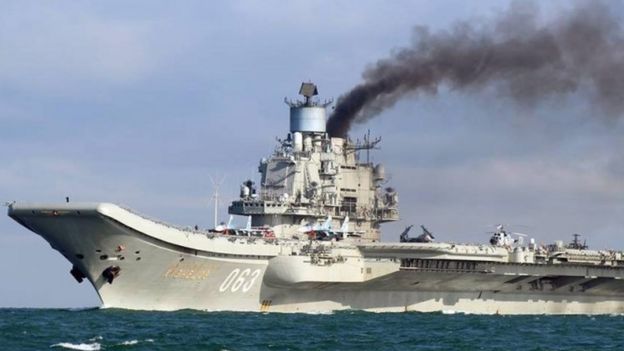 Image copyrightEPA
Image copyrightEPA
Image captionThe recent transit of a small naval task force led by the Admiral Kuznetsov (above) through the English Channel sent many British newspapers into a spin
The simple fact is that this is not a Cold War Mark II - far from it. Russia with its declining economy is nothing like the Soviet Union, which aspired to establish a different world order to that pursued by the capitalist West.
Russia is in many ways a weak country. Its leadership has a strong sense of encirclement - a view that the West is only eager to do it down - and, rightly or wrongly, this is driving Mr Putin's more assertive approach.
That is what is making Nato allies like the three Baltic Republics and Poland so worried. That is why countries like Romania and Bulgaria worry about Russia's behaviour in the Black Sea region.
And that is why Nato has sought to provide visible and highly symbolic reinforcements to its northern and south-eastern flanks.
Hard times
But Nato has to square a circle here. Despite Mr Putin's barbs, there is no great enthusiasm for a new conventional arms race.
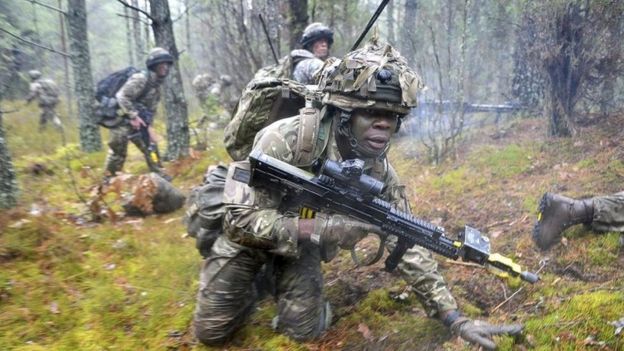 Image copyrightPA
Image copyrightPA
Image captionNato says it is responding to the threat posed by Russia through deterrence
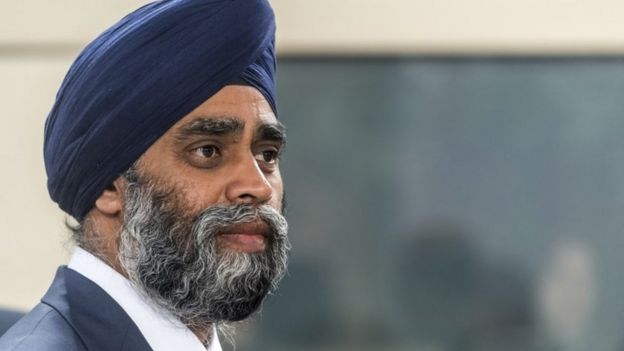 Image copyrightAP
Image copyrightAP
Image captionCanadian Defence Minister Harjit Singh Sajjan argues the Nato alliance is coming together and operating with greater cohesion
The economies of the European allies, for a start, are generally not in great shape. Indeed Europe is distracted by the migrant crisis sweeping in from the Middle East and the self-inflicted drama of Britain's planned exit from the EU.
So the problem here in Brussels has been to do enough both to reassure worried Nato members and to send a clear message of deterrence towards Moscow.
The Americans are sending a heavy armoured brigade to western Europe, bringing the total number of US Brigade combat teams on the continent to three.
The new brigade will initially go to Poland and then elements will deploy to Romania, Bulgaria and the three Baltic republics. Equipment for a further US brigade will be pre-deployed in Europe.
But the whole point of sending a signal of deterrence is not that the US shoulders all of the burden but that as many Nato countries as possible are involved.
Still in business
The method of doing this is by the deployment of four multi-national battalions - one to each of the Baltic republics and the other to Poland. Each of these units will be about 1,000 strong, comprising in most cases mechanised infantry, with a few supporting arms.
The UK, for example, will lead the battalion going to Estonia.
It will have Warrior armoured fighting vehicles, a small number of tanks and additional companies of French and Danish troops.
The US will lead the battalion going to Poland, along with a small number of British and Romanian soldiers. Canada and Germany will lead the remaining two battalions again with small additions to give them a multi-national character.
Canada's Minister of National Defence, Harjit Sajjan, told me his country would be commanding the battalion going to Latvia.
In his view, the deployment of these multi-national units early next year demonstrates the alliance "coming together, showing the ability to operate together and greater cohesion".
"It is", he said, "an open and transparent message of deterrence."
But the reassurance effort is not just northwards. Canada will be participating in a new air policing operation in the south-east - probably based out of Romania - and a Canadian warship will also be despatched to the Black Sea to help provide an enhanced Nato presence.
But I put it to him that in practice these are very small forces. Enhanced battalions are surely not going to impress Moscow? Not surprisingly the Canadian defence minister disagreed, insisting that the multi-national model sent "a very strong message to Russia".
Nato is taking small military steps to underline to Moscow that it still is very much in business and that despite all the clouds on Europe's horizons it can make decisions swiftly and deploy forces accordingly.
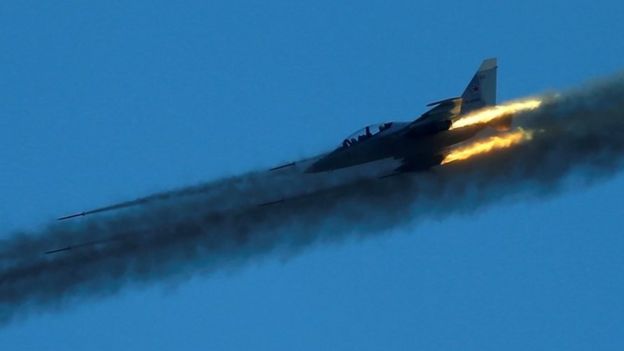 Image copyrightREUTERS
Image copyrightREUTERS
Image captionThis is not a Cold War Mark II but it is a sign of an increasingly assertive Russia
Are Russian tank armies ready to sweep westwards, as they were at the height of the Cold War? Probably not.
But is Russia ready to use force in Europe, where it can to secure its goals? Most certainly.
Countries like Georgia and Ukraine still have far more to fear from Moscow than Nato.
But the alliance's security rests upon meaningful guarantees that its member states are all in it together, both in good and bad times.
This week has been about consolidating and underlining those guarantees - the message to Moscow is clear.
Nato sends a message to Russia - BBC News
Jonathan Marcus Diplomatic correspondent
- 9 hours ago
- From the sectionWorld

Image captionPresident Putin insists the West has nothing to fear over the manoeuvres of his forces
President Vladimir Putin's assurance that Russia does not plan to attack any other country will not change many minds here at the Nato headquarters in Brussels.
They will simply point to the seizure of the Crimea and the Russian military's continuing support for the rebels in eastern Ukraine as a sure sign of Moscow's growing assertiveness.
Mr Putin also says that the Russian military threat is being exaggerated in the West to justify increased military spending.
Well there is certainly a good deal of hyperbole in some sections of the Western media.
The transit of the small naval task force led by Russia's sole and ageing aircraft carrier - the Admiral Kuznetsov - through the English Channel, for example, sent many British newspapers into a spin.
Not a new Cold War
Frequent stories about the interception of Russian aircraft or Russian submarines all suggest a return to the more uneasy years of the Cold War.

Image captionRussia has shown in the recent past that it is sometimes ready to use force in Europe to secure its goals

Image captionNato defence chiefs in Brussels want to reassure worried alliance members and send a clear message to Moscow that they can respond to aggression

Image captionThe recent transit of a small naval task force led by the Admiral Kuznetsov (above) through the English Channel sent many British newspapers into a spin
The simple fact is that this is not a Cold War Mark II - far from it. Russia with its declining economy is nothing like the Soviet Union, which aspired to establish a different world order to that pursued by the capitalist West.
Russia is in many ways a weak country. Its leadership has a strong sense of encirclement - a view that the West is only eager to do it down - and, rightly or wrongly, this is driving Mr Putin's more assertive approach.
That is what is making Nato allies like the three Baltic Republics and Poland so worried. That is why countries like Romania and Bulgaria worry about Russia's behaviour in the Black Sea region.
And that is why Nato has sought to provide visible and highly symbolic reinforcements to its northern and south-eastern flanks.
Hard times
But Nato has to square a circle here. Despite Mr Putin's barbs, there is no great enthusiasm for a new conventional arms race.

Image captionNato says it is responding to the threat posed by Russia through deterrence

Image captionCanadian Defence Minister Harjit Singh Sajjan argues the Nato alliance is coming together and operating with greater cohesion
The economies of the European allies, for a start, are generally not in great shape. Indeed Europe is distracted by the migrant crisis sweeping in from the Middle East and the self-inflicted drama of Britain's planned exit from the EU.
So the problem here in Brussels has been to do enough both to reassure worried Nato members and to send a clear message of deterrence towards Moscow.
The Americans are sending a heavy armoured brigade to western Europe, bringing the total number of US Brigade combat teams on the continent to three.
The new brigade will initially go to Poland and then elements will deploy to Romania, Bulgaria and the three Baltic republics. Equipment for a further US brigade will be pre-deployed in Europe.
But the whole point of sending a signal of deterrence is not that the US shoulders all of the burden but that as many Nato countries as possible are involved.
Still in business
The method of doing this is by the deployment of four multi-national battalions - one to each of the Baltic republics and the other to Poland. Each of these units will be about 1,000 strong, comprising in most cases mechanised infantry, with a few supporting arms.
The UK, for example, will lead the battalion going to Estonia.
It will have Warrior armoured fighting vehicles, a small number of tanks and additional companies of French and Danish troops.
The US will lead the battalion going to Poland, along with a small number of British and Romanian soldiers. Canada and Germany will lead the remaining two battalions again with small additions to give them a multi-national character.
Canada's Minister of National Defence, Harjit Sajjan, told me his country would be commanding the battalion going to Latvia.
In his view, the deployment of these multi-national units early next year demonstrates the alliance "coming together, showing the ability to operate together and greater cohesion".
"It is", he said, "an open and transparent message of deterrence."
But the reassurance effort is not just northwards. Canada will be participating in a new air policing operation in the south-east - probably based out of Romania - and a Canadian warship will also be despatched to the Black Sea to help provide an enhanced Nato presence.
But I put it to him that in practice these are very small forces. Enhanced battalions are surely not going to impress Moscow? Not surprisingly the Canadian defence minister disagreed, insisting that the multi-national model sent "a very strong message to Russia".
Nato is taking small military steps to underline to Moscow that it still is very much in business and that despite all the clouds on Europe's horizons it can make decisions swiftly and deploy forces accordingly.
- Are we entering a new Cold War?
- Nato looks east (and south)
- How Moscow's bombing campaign has paid off for Putin

Image captionThis is not a Cold War Mark II but it is a sign of an increasingly assertive Russia
Are Russian tank armies ready to sweep westwards, as they were at the height of the Cold War? Probably not.
But is Russia ready to use force in Europe, where it can to secure its goals? Most certainly.
Countries like Georgia and Ukraine still have far more to fear from Moscow than Nato.
But the alliance's security rests upon meaningful guarantees that its member states are all in it together, both in good and bad times.
This week has been about consolidating and underlining those guarantees - the message to Moscow is clear.
Nato sends a message to Russia - BBC News
88m3
Fast Money & Foreign Objects
Russia warships: Kuznetsov battle group 'refuels off North Africa'
Share
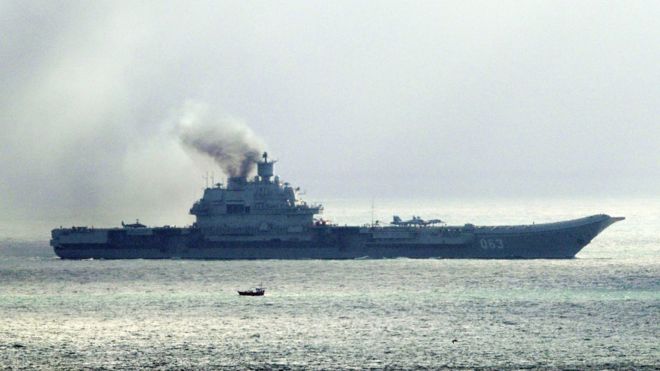 Image copyrightPA
Image copyrightPA
Image captionRussia's only aircraft carrier, the Admiral Kuznetsov, will join Russian vessels already off the Syrian coast
Syria rebels set up camp for IS defectors
A group of warships including Russia's only aircraft carrier, the Admiral Kuznetsov, is reportedly refuelling at sea off North Africa en route to Syria.
Plans for some of the ships to dock at a Spanish port were cancelled after Nato allies voiced concern.
Nato is concerned planes from the carrier could be used to attack civilians in the Syrian city of Aleppo.
President Vladimir Putin also hinted that an aerial bombardment of rebel-held east Aleppo could resume.
Russia and its ally, the Syrian government, had said earlier that they would continue a moratorium on the bombing.
At an international conference in the Russian city of Sochi on Thursday, Mr Putin said other parties to the conflict had not been keeping their promises.
"Where is the disengagement of terrorists from the healthy part of the opposition?" Mr Putin asked.
"So far we have been restrained, and we have not been rude to our partners, but everything has its limits. We could respond."
The Admiral Kuznetsov can carry dozens of fighter bombers and helicopters. It has been sailing for the past week from Russia to the Mediterranean.
Intrigued by what is going on in modern Russia? You may like to read some other stories which sailed into view this week:
The BBC's Jonathan Marcus reports from Brussels that the battle group is currently at anchor off the North African coast and taking on fuel.
The group has two "oilers" (tankers) with it and it is not clear which of the vessels is actually refuelling, he adds.
The Russian embassy in Madrid formally withdrew a request to Spain for refuelling after being approached by the Spanish foreign ministry.
"Given the information which appeared on the possibility that these ships would participate in supporting military action in the Syrian city of Aleppo, the ministry of foreign affairs requested clarification from the embassy of the Russian Federation in Madrid," the Spanish foreign ministry had said on Wednesday in a statement to the BBC.
It added that permission had been granted in September for three Russian ships to dock in the port of Ceuta between 28 October and 2 November. It said such stops for Russian naval vessels had taken place for years in Spanish ports.
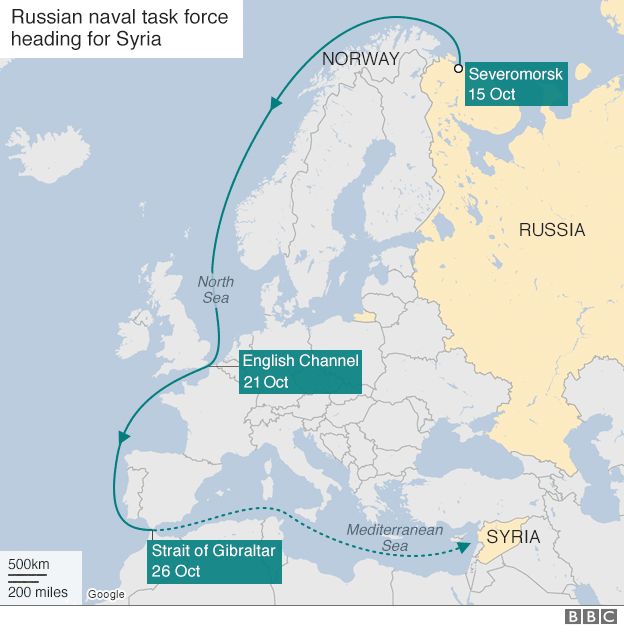
Nato had said the final decision on resupply rested with Spain.
"We are concerned and I have expressed that very clearly about the potential use of this battle group to increase Russia's ability and to be a platform for air strikes against Syria," Nato's Secretary-General Jens Stoltenberg told journalists on Tuesday.
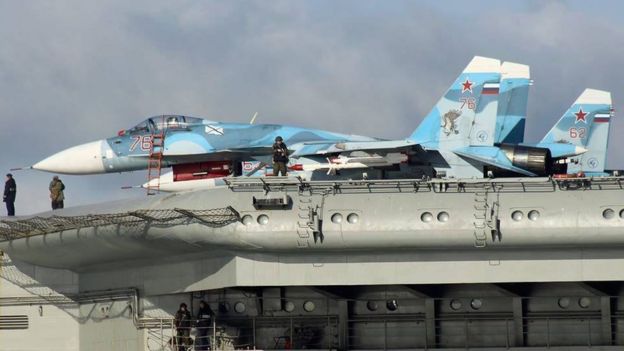 Image copyrightEPA
Image copyrightEPA
Image captionThe warships came down the Channel
The naval group also includes a nuclear-powered battle cruiser, two anti-submarine warships and four support vessels, probably escorted by submarines.
The battle group is expected to join about 10 other Russian vessels already off the Syrian coast.
Some 2,700 people have been killed or injured since the Russian-backed Syrian offensive started last month, according to activists.
Western leaders have said Russian and Syrian air strikes on Aleppo could amount to war crimes, an accusation rejected by Russia.
About 250,000 civilians who live in Aleppo have been trapped by the fighting. Moscow announced last week a "humanitarian pause" in attacks as part of a plan to allow civilians and fighters to leave the area.
Russia warships: Kuznetsov battle group 'refuels off North Africa' - BBC News

- 9 hours ago
- From the sectionEurope
Share

Image captionRussia's only aircraft carrier, the Admiral Kuznetsov, will join Russian vessels already off the Syrian coast
Syria rebels set up camp for IS defectors
A group of warships including Russia's only aircraft carrier, the Admiral Kuznetsov, is reportedly refuelling at sea off North Africa en route to Syria.
Plans for some of the ships to dock at a Spanish port were cancelled after Nato allies voiced concern.
Nato is concerned planes from the carrier could be used to attack civilians in the Syrian city of Aleppo.
President Vladimir Putin also hinted that an aerial bombardment of rebel-held east Aleppo could resume.
Russia and its ally, the Syrian government, had said earlier that they would continue a moratorium on the bombing.
At an international conference in the Russian city of Sochi on Thursday, Mr Putin said other parties to the conflict had not been keeping their promises.
"Where is the disengagement of terrorists from the healthy part of the opposition?" Mr Putin asked.
"So far we have been restrained, and we have not been rude to our partners, but everything has its limits. We could respond."
The Admiral Kuznetsov can carry dozens of fighter bombers and helicopters. It has been sailing for the past week from Russia to the Mediterranean.
Intrigued by what is going on in modern Russia? You may like to read some other stories which sailed into view this week:
The BBC's Jonathan Marcus reports from Brussels that the battle group is currently at anchor off the North African coast and taking on fuel.
The group has two "oilers" (tankers) with it and it is not clear which of the vessels is actually refuelling, he adds.
The Russian embassy in Madrid formally withdrew a request to Spain for refuelling after being approached by the Spanish foreign ministry.
"Given the information which appeared on the possibility that these ships would participate in supporting military action in the Syrian city of Aleppo, the ministry of foreign affairs requested clarification from the embassy of the Russian Federation in Madrid," the Spanish foreign ministry had said on Wednesday in a statement to the BBC.
It added that permission had been granted in September for three Russian ships to dock in the port of Ceuta between 28 October and 2 November. It said such stops for Russian naval vessels had taken place for years in Spanish ports.

Nato had said the final decision on resupply rested with Spain.
"We are concerned and I have expressed that very clearly about the potential use of this battle group to increase Russia's ability and to be a platform for air strikes against Syria," Nato's Secretary-General Jens Stoltenberg told journalists on Tuesday.
- Are we entering a new cold war?
- Why Assad wants to take Aleppo
- Aleppo: Key battleground in Syria's war

Image captionThe warships came down the Channel
The naval group also includes a nuclear-powered battle cruiser, two anti-submarine warships and four support vessels, probably escorted by submarines.
The battle group is expected to join about 10 other Russian vessels already off the Syrian coast.
Some 2,700 people have been killed or injured since the Russian-backed Syrian offensive started last month, according to activists.
Western leaders have said Russian and Syrian air strikes on Aleppo could amount to war crimes, an accusation rejected by Russia.
About 250,000 civilians who live in Aleppo have been trapped by the fighting. Moscow announced last week a "humanitarian pause" in attacks as part of a plan to allow civilians and fighters to leave the area.
Russia warships: Kuznetsov battle group 'refuels off North Africa' - BBC News

